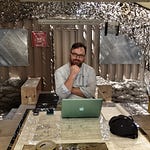This was written ten years ago, and it holds true as far as studio sitcoms are concerned. But there aren’t many of those at the moment. Why? Discuss.
Let’s say the read-through went well, your show has the green light – and it’s happening. They’re shooting your pilot. Maybe even a series. Now what? Prepare yourself for the real work to begin, albeit fun and better-paid work. In this section, we look at the work of the writer when the show goes into production.
It’s hard to be proscriptive here because there doesn’t seem to be any real consensus about how involved the writers should be in rehearsals, shooting and editing.
My first TV sitcom was writing My Hero – which had a fairly standard approach for a studio sitcom. The episode was filmed on a Friday night. I was expected to turn up to a rehearsal room (usually a church hall in West London) on Monday morning for a readthrough of the script, which had already been heavily vetted and rewritten (by me). The episode would be read through, the actors would take a break and there’d be some last-minute changes agreed. That might generate a few hours of homework – because there wasn’t much time to mess around rewriting scenes unless they really weren’t working. So you’d send off your changes that afternoon and they’d be folded into the shooting script.
Then I’d go in on Thursday morning for a run-through. By now the show has been blocked (which means everyone knows who moves and stands where and when). There’s been a fair amount of rehearsal and everyone should be confident in the script. The actors (mostly) know their lines – and some new lines might have appeared, or your existing lines might have been tweaked, often for boring, practical blocking reasons. Perhaps a line needs to be longer so a character can walk from the Grandfather clock to the hatch in the wall.
After that run-through (sometimes called The Producer’s Run), you can give the director, or producer, a few notes. Ideally, these shouldn’t be fussing over bits that you’ve never managed to get right. It’s too late for that. You had your chance. Normally, the notes are noticing lines that have changed a little, and now have a different meaning, so the rest of the story feels out of kilter with it. It’s usually subtle stuff like that.
Your next stage is The Technical Run-through (The Tech Run) on the Friday afternoon. This is essentially a dress rehearsal, so you can see the whole show with costume, props and all. By now the cast are exhausted, fed-up and saving themselves for the night, so you can’t read too much into performances. But again, it’s mostly making sure the episode is on track.
When the show is being filmed in front of the audience, there’s really not much to be done, other than being another set of eyes and ears on the night to make sure the lines are executed correctly. An example might be that a form of words needs to be said by one character in an exact way, the line has slipped, and now doesn’t match something that’s been pre-recorded, so you need a take which matches it. It would be fine to point that out. If it’s not absolutely essential, best keep your mouth shut. Other than to laugh, or make compliments.
The process I’ve just described was fairly commonplace for a mainstream studio sitcom in its fourth series at the time. Obviously, there is a lot of variation. As it stands, most sitcoms are not filmed in front of an audience. The vast majority are filmed on location. For every Mrs Brown’s Boys, there’s a Toast of London, a Catastrophe and a Crims. This involves the writer spending lots of time filming on location. In the next chapter, let’s look at that.
A few months ago, I ran a webinar about plotting your sitcom. It’s still available to watch as a replay for a small sum of your choosing. Why not have a look - and support this blog?














Share this post